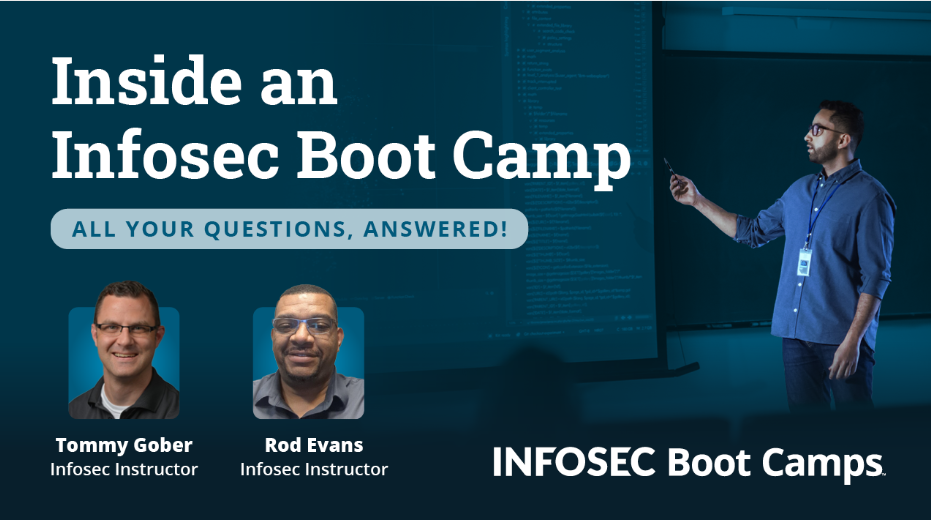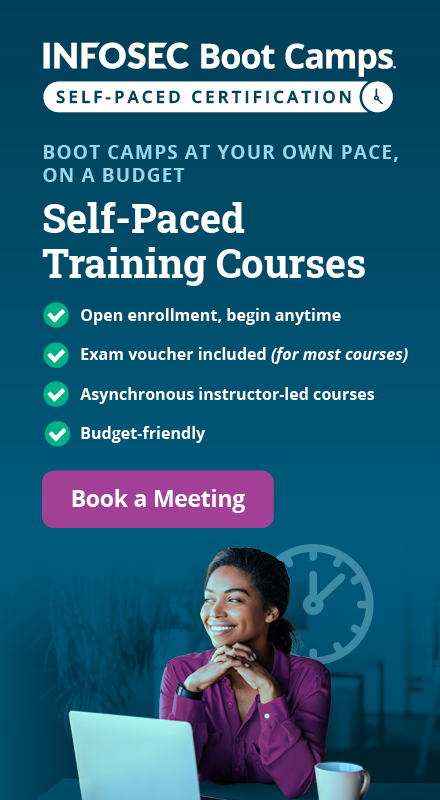Not all team cybersecurity boot camps are the same: What you need to know

You may be right if you think a boot camp will help your team hit its training and certification goals. At the same time, a boot camp is an investment, so it’s important to carefully evaluate your choices before choosing which one is best for your organization.
This guide covers the most important factors to consider while selecting a boot camp for your team — based on 20 years of training tens of thousands of students to reach their career goals. This guide will focus on these six areas:
- Choosing the right type of boot camp
- Evaluating goals and curriculum
- Finding the best training provider
- Getting support for you and your team
- Determining the best pricing
Continue reading
Sorry, we're unable to load the form at the moment. Please check your browser's settings to confirm the form is not blocked. You can contact us and report the issue here: infosec.info@cengage.com.
1. Choosing the right type of boot camp
Choosing the right type of boot camp should be one of your primary considerations because this will determine how well the boot camp fits your team’s goals. Selecting the right boot camp also impacts your team member’s schedules and your company’s budget.
Cybersecurity boot camps usually offer everything learners need in one comprehensive package. This can include preparatory materials, expert instruct...
You may be right if you think a boot camp will help your team hit its training and certification goals. At the same time, a boot camp is an investment, so it’s important to carefully evaluate your choices before choosing which one is best for your organization.
This guide covers the most important factors to consider while selecting a boot camp for your team — based on 20 years of training tens of thousands of students to reach their career goals. This guide will focus on these six areas:
1. Choosing the right type of boot camp
Choosing the right type of boot camp should be one of your primary considerations because this will determine how well the boot camp fits your team’s goals. Selecting the right boot camp also impacts your team member’s schedules and your company’s budget.
Cybersecurity boot camps usually offer everything learners need in one comprehensive package. This can include preparatory materials, expert instruction, additional training resources like books and hands-on labs, practice exams, vouchers to take the exam and more. However, each type of boot camp delivers those materials in different ways.
Option 1: Live boot camps
A live boot camp is a short-term, intensive training in a structured environment that typically lasts three to seven days. It is your fastest route to certification for your team.
The primary advantage of live instruction is having everyone’s questions answered by experienced, qualified instructors and learning from fellow students’ questions. Your team members may also form connections that can pay off down the road if one or more of their classmates have experiences they can share if on-the-job challenges arise down the road.
FREE role-guided training plans

Live in-person boot camp
In-person boot camps include live instruction taught in a classroom. This means you may need to consider potential costs related to your team’s travel and lodging. Although travel adds to the cost, they may prefer having dedicated time and space away from the distractions of daily life, so they can focus entirely on learning the material and passing their exams.
However, you may also be able to get training delivered right to your office. At Infosec, for instance, if you have a large enough group, we can offer on-site classes, so your team can get the training they need without leaving their workplace.
Live online boot camp
Live online boot camps are taught over the computer, so your team can train from anywhere without traveling. An industry expert leads their sessions, so the content quality equals what they get in person. They can also have discussions with classmates and enjoy networking opportunities — they just do it online. However, they still need to clear their schedules and find places to study away from interruptions.
Option 2: Self-paced boot camps
A self-paced boot camp is exactly as it sounds: Your team members get access to the training materials, and they follow those materials at their own pace. A typical self-paced boot camp takes one to three months to complete.
They often get some level of guidance and support from qualified instructors who can answer their questions and clarify concepts they’re struggling with. However, it’s important to understand how that support will be delivered. For example, it could be via email, a forum, online office hours or some other method.
With this type of boot camp, they can design their own study schedules, including how long they study for and where which gives them the power to learn at their own pace. This is especially helpful for professionals because it gives them the flexibility to decide how to use their off-work hours to prep for their certifications.
Option 3: Immersive boot camps
Immersive boot camps help your IT team transform their skills and career options over several months of training. They’re much more in-depth than the other options and provide a mix of live instruction and self-paced learning.
One of the primary differentiating factors of an immersive boot camp is the emphasis on career transformation. For example, a beginner immersive boot camp could be great for people looking to transition into a different IT discipline, but they need more guidance and support than they would get with a live or self-paced boot camp. These also come with career coaching, further helping to advance cybersecurity careers.
In addition to training from industry experts, your team members will work on projects that showcase their new skills and help them build a professional portfolio. In other words, even if they haven’t had much experience in the area they’re training for, by the end of an immersive boot camp, they have both the skills and practical experience to hit the ground running.
Picking a boot camp: What’s your goal?
Each of the three kinds of boot camps prepares your team for a certification exam. However, with live and self-paced boot camps, getting certified and applying their knowledge on the job are the primary focuses.
With an immersive boot camp, the program is specifically designed to help them transform their careers. If they are relatively new to cybersecurity and looking for more in-depth knowledge, an immersive boot camp may be your best investment.
For example, with Infosec’s Cybersecurity Beginners Immersive Boot Camp, we teach your team job-ready, in-demand skills with over 500 hours of hands-on experience to help them deeply understand and retain topics. The lessons build skills progressively, from the basics, like computer operations, to advanced topics, like cybersecurity engineering.
What should you learn next?

2. Evaluating goals and curriculum
It’s important to ensure the content of the boot camp aligns with your goals as a manager. For example, you should ask questions such as:
- What are your goals for your department?
- Is it enough to get training for a specific certification?
- Do you need the freedom to customize the training for your team so they learn specific skills that align with your organization or the tech stack?
- Are you looking for more long-term, transformational training for your team?
Ideally, you want a boot camp led by a company with existing relationships with industry-leading organizations. For instance, Infosec has forged long-standing industry relationships with certifying bodies, partnering with CompTIA, ISACA, EC-Council, Microsoft, AWS and more. These certifying bodies update their certifications every few years using input from industry professionals to ensure the relevancy of each certification.
Understanding the value of pre-course work
Most boot camps present a lot of information condensed over a short timeframe. To ensure all candidates have a rewarding experience, they often have supporting materials to help them prepare and start learning before the boot camp begins.
If you’re considering which boot camp to buy, the availability of pre-course work is a major factor.
3. Finding the best training provider
When evaluating boot camps for your team, it’s important to look at the company’s reputation. A few factors you may want to consider:
- Training history: Has the company been around for a considerable length of time, or are they a relative newcomer to the training space?
- Training outcomes: What is the track record for student success? For example, Infosec students have an average certification pass rate of 93%.
- Student reviews: The best insight into training quality often comes from student reviews. You can read about past students’ experiences on sites like G2, TrustRadius and others.
The most important factor in the quality of your team’s training will likely be the expertise of their instructor. As you read reviews and evaluate potential boot camps, try to get a sense of both what students say about their instruction and the guidelines companies use for selecting instructors.
Or hear directly from the instructors. Infosec recently hosted an open Q&A with two of our instructors, Tommy Gober and Rod Evans. Watch the webinar to learn what to expect from a live Infosec boot camp.
4. Getting support for you and your team
Boot camps vary widely in their offerings, and the differences aren’t always obvious. By digging a little, you can typically figure out what differentiates the support you get from each program.
For example, let’s look at training materials. It would help if you asked questions like:
- When will my team members have access to training materials?
- How extensive are the training materials the company provides?
- Are they included in the cost of the boot camp, or will we have to pay extra?
Similarly, you should assess the level of support provided before, during and after a boot camp. Here are some criteria you can use in your evaluation:
- Pre-boot camp: At Infosec, learners get immediate access to pre-course materials when they enroll. This helps them to prepare for their boot camp and uncover their knowledge gaps so they can maximize their training experiences.
- During the boot camp: Be sure to understand how the boot camp is structured. What materials will your team use during the training? If it’s technical training, will there be hands-on labs? If the primary goal is certification, is there access to practice tests?
- After the boot camp: Is there any support offered after the boot camp? For example, Infosec live boot camps come with 90 days of extended access to recordings and other materials, so your team members can review challenging topics. They also get access to the Infosec Skills training library so they can continue learning or start earning CPEs for their new certifications.
At the same time, you must ensure the company provides you with the support you need as a manager. For example, do they make it easy to administer the training, whether you’re sending your team to the training venue or the instructor is coming to your office?
Also, you want a company that makes it easy for you to keep track of your team’s prep leading up to the boot camp. They should also provide a way for you to check on their progress during and after the boot camp as well.
Additional support value-adds
You should ask what happens if any of your team members fail their certification exam. Infosec offers an Exam Pass Guarantee for most live boot camps, meaning if you fail the exam on your first attempt, you’ll get a second attempt at no cost to you — and you can re-sit the boot camp for free for up to one year.
As an additional value add, Infosec also offers a Knowledge Transfer Guarantee. With this feature, if an employee gets their certification and then leaves within three months, Infosec will train another team member at your organization, tuition-free, for up to a year.
If you take an immersive boot camp, one of the most important outcomes is the ability to build job-ready skills. Infosec’s programs include an additional 6 weeks’ access to the Infosec Skills training library. This allows employees to take the in-depth knowledge they learned in the boot camp and begin adding skills tailored to their specific role and the needs of your organization.
Get your guide to the top-paying certifications
With more than 448,000 U.S. cybersecurity job openings annually, get answers to all your cybersecurity salary questions with our free ebook!
5. Determining the best pricing
Gaining a comprehensive understanding of the full cost of boot camps and your financing options can also tip the scales in favor of one or another. Your financial assessment should take into consideration:
- Opportunities to save money, especially by buying training in bulk instead of having employees enroll individually. This often results in significant savings.
- Whether you can purchase pre-paid training packages. For instance, you may have 20 employees who all need different training, but you don’t know which one each person needs yet. You may still be able to take advantage of a bulk discount.
- Whether you can host an on-site or custom boot camp. If you have enough students, this can save considerable cash when it comes to their travel or lodging.
- The “full” cost: When comparing boot camps, be sure you understand what’s included — and what’s not. For example, some providers may not include the exam voucher or all the training materials, which often costs hundreds of dollars per employee.
- Long-term value: This is an investment, but will you and your team expect to get a return on that investment in terms of long-term value for your company, better-educated employees, higher employee retention, professional satisfaction or some other metric?
Making your decision: Boot camp comparison takeaways
By selecting the right cybersecurity boot camp, you give your team members the skills and experience they need to power the long-term success of your IT department. The key to choosing the right one is consolidating all your research so you can compare them side-by-side.
You should also develop a checklist of the criteria most important to you and your department — then see which boot camps meet your needs. Additional factors may play a role as well, such as the boot camp’s physical location, flexibility with your team’s learning schedule, and whether the company offers exam pass guarantees.
With this guide, you have everything you need to make a well-informed decision. By carefully examining the credentials and contents of each boot camp on your list, you can find one that aligns with your department’s goals and provides the necessary support and features.
Ellen Pincus is a communication and marketing professional with over a decade of creative experience helping innovative organizations differentiate their voice. As the content marketing specialist for Infosec, she enjoys empowering cyber professionals and students with skills and knowledge to advance their careers and outsmart cybercrime.
Get certified and advance your career!
- Exam Pass Guarantee
- Live instruction
- CompTIA, ISACA, ISC2, Cisco, Microsoft and more!



